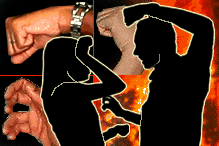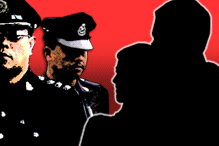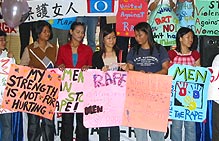PAIN is always one emotion people try not to think of, if they can have their way. But the reality is that often times, the angst tends to linger on.
Trying to put the pain behind is what college student Beena (not her real name) intends to do. A rape survivor, this teenager wants to put the ordeal behind and get on with her life.
Beena, 19, was molested and raped on various occasions by a man with whom she had befriended. Yet, she had neither lodged any police report nor informed anyone of her ordeal.
Beena's nightmare did not stop there. The man had also left lewd messages on her mobile phone, humiliating her with demeaning names.
 Beena who shared her nightmare with
Bernama
recently on condition of anonymity, said she was terrified to mention even a word of the incident to her mother and grandmother.
Beena who shared her nightmare with
Bernama
recently on condition of anonymity, said she was terrified to mention even a word of the incident to her mother and grandmother.
"I love them a lot and am scared of losing them. I do not know what to do. I did a pregnancy test and was relieved when the results were negative. I want to continue with my studies and carry on with my life. Sometimes, it bothers me that I did not seek help. But then I try and not think about what happened and want to put it behind," she added.
"So far, everything has been quiet. The man is getting married in July. For me I hope I can forget what happened," she said.
But can she, really?
Rape cannot be 'forgotten'
A rape survivor will never forget her ordeal, says independent consultant psychologist Valerie Jaques.
Jaques said what could change is the survivor's emotional response to the incident.
"Many who recall the incident will feel the same emotions that they felt during the ordeal.
As they grow older and if they are trying to hide or run away from the fact, then these emotions will get worse and may result in flashbacks and recurring nightmares that would subsequently give rise to high anxiety, panic attacks, edging the person towards depression.
The longer these emotions and experience are suppressed, the more drastic the emotional and psychological repercussion would be when it is uncovered," she said.
Jaques explained the sooner the experiences were brought to light through awareness exercises, the more the survivor was able to focus on the memory just as a thought, without any emotional baggage attached.
"Eventually it will not be harmful" she said.
 Jaques said the psychological scar faced by a rape survivor depended on the support available.
Jaques said the psychological scar faced by a rape survivor depended on the support available.
"If there is a lot of family support, care and encouragement in realising that rape is a crime against the person and that this person is not socially looked down upon, then there is little scarring. In fact this person can rise up to champion against such abuses," she added.
However, if the survivor comes from an environment where she is blamed for the rape and put down and rejected, the psychological trauma due to the humiliation, rejection and lack of support will leave her with a life-long 'scar'.
"Often the wound re-opens whenever the survivor is faced with challenges that invoke emotional responses. It is imperative for any person who has been through such an ordeal, to get support, to be made to feel loved and accepted in spite of what happened. Sadly, this is where our society has much to learn," Jaques said.
Another survivor's ordeal
Another rape survivor, who calls herself Amy said seeking support is very important albeit the worry and fear of being discriminated. The victim needs to overcome the fear of being ostracised and seek the much needed counseling and support, she pointed out.
Amy was only 11 when a relative raped her 20 years ago.
"I spent my growing up years blaming myself for what happened and it took me a while to realise that it was not my fault.
 The painful memory will never go away, much as I wish I could forget it, it is just wishful thinking. So the best way is to accept what happened and deal with the pain and get on with life. Healing will be a painful process but we survivors owe it to ourselves to come out of this painful emotions and move on," she said.
The painful memory will never go away, much as I wish I could forget it, it is just wishful thinking. So the best way is to accept what happened and deal with the pain and get on with life. Healing will be a painful process but we survivors owe it to ourselves to come out of this painful emotions and move on," she said.
All Women's Action Society (Awam) executive director Honey Tan Lay Ean said the fear of societal stigma surrounding rape victims, including blaming the victim and the belief that the woman had had a hand in causing the rape, is a powerful deterrant preventing them from seeking help.
"There is great pressure on the victim not to report the rape because as police statistics show, more than 80 percent of the perpetrators are people known to the victim, which means the rapist is no stranger," Tan told Bernama.
She said putting the rape 'behind' was not the same as not taking any action.
"A survivor can only begin to heal and move forward when she has some form of support, through counseling for instance. Whilst survivors often go into a state of denial , the psychological consequences will persist for years after.
"From Awam's experience, survivors can live a reasonably functional life but the trauma caused by the rape may be triggered again by any incident that remotely reminds them of the assault," Tan said.
Tan said it was not the rape survivor's duty to provide moral lessons to the public in handling rape.
She said on the contrary the focus should be on the community's role to send out a message to the perpetrators that violence will not be tolerated and to push for legal reforms that would ensure better access to justice for rape survivors.
"Rape is a crime of violence that uses sex as a weapon and a reflection of the power imbalance within society. Therefore it is contingent upon the community to correct this imbalance and support the survivors instead of perpetuating myths about rape," Tan stressed.
- Reproduced with permission from Bernama

